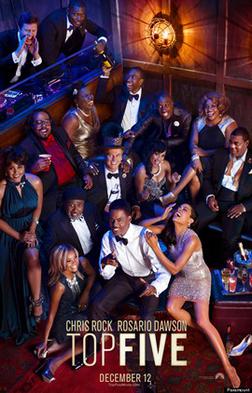 It’s a high-five for
Top Five, Chris Rock’s self-referential, day-in-the-life account of
former alcoholic comic, Andre Allen, who cannot catch a break in
being taken seriously. Rock writes, directs and stars as Allen, whose
pursuit to be a respected and relevant actor has put some stand-up
talent to bed.
It’s a high-five for
Top Five, Chris Rock’s self-referential, day-in-the-life account of
former alcoholic comic, Andre Allen, who cannot catch a break in
being taken seriously. Rock writes, directs and stars as Allen, whose
pursuit to be a respected and relevant actor has put some stand-up
talent to bed.
In 2001, Chris Rock was
labelled by Time Magazine and Entertainment Weekly, as ‘the
funniest man in America’. Since then he has gone on to film
projects that have hardly been critical darlings, the likes of Grown
Ups and Head of State spring to mind. One might say then that Top
Five’s protagonist mirrors Rock himself, someone who has never
quite had the prolificacy in film as he has had in comedy. With this
entry into his filmography however, he produces an authentic and, at
times, hilarious depiction of the deformed, dysfunctional, deranged
world of celebrity. Rock integrates his trademark gusto and
high-pitched delivery, peppered with profanity, into the performance.
Oh, and he jettisons in the N-word wherever possible, a predominant
feature of his stand-up routines. Rosario Dawson, as a New York Times
reporter who interviews Andre Allen for the entirety of the feature,
grabs herself some good-ish material. Rock also over-indulges us with
an array of cameos, including Adam Sandler, Whoopi Goldberg and Jerry
Seinfeld, who bring the funny late on.
Certain critics might
be repelled by some gross-out sequences, yet these will appeal to a
broader audience, graduates of such films like American Pie and
There’s Something About Mary. Also, there may be a sprinkling of
the derogatory, but the substance and satire of Top Five will engage
with the cultured crowd too. The wondering around the city and
sporadically intelligent musings reminisce Linklater’s ‘Before’
movies, as well as Rock’s own picture with Julie Delpy, Two Days in
New York. Although not all the jokes induce a laugh-out-loud
reaction, some are quite middling in fact, this is Rock’s best
cinematic outing to date. And like I said, it merges intellect with
the, well, disgusting stuff. Think French New Wave meets the Farrelly
brothers.

